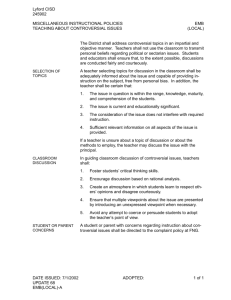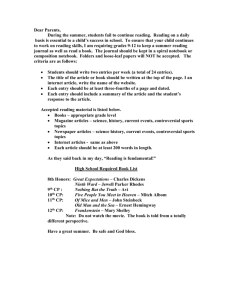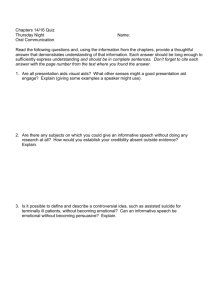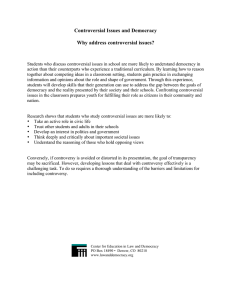Persuasive Speaking Tips
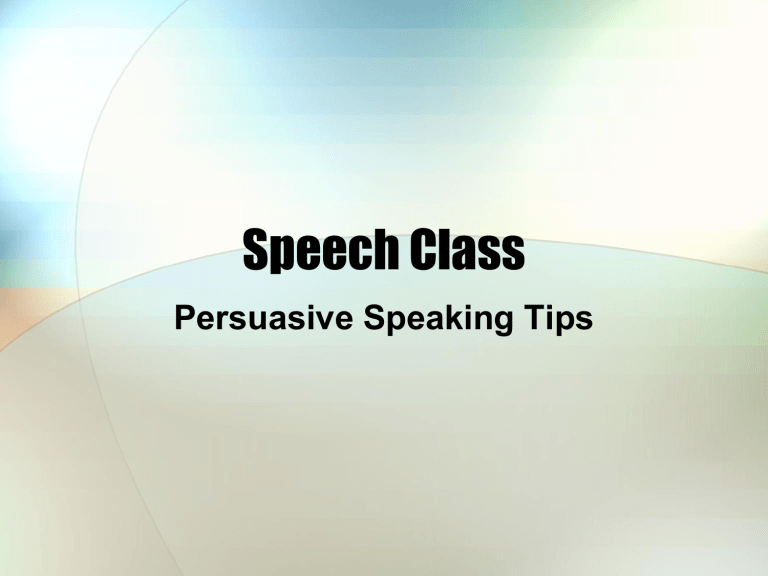
Speech Class
Persuasive Speaking Tips
Persuasive Speaking Tips
There is no “ formula ” for giving an excellent persuasive speech. What one person finds convincing may not be exactly the same as another person.
However, there are some things you can do to make your speech more convincing.
Your Topic
First, choose a good topic.
It must be controversial .
This means people have strong, differing opinions about the topic.
The topic is debatable, or “ open to debate ” .
Your Topic
If your topic is not controversial
– or only minimally controversial – it will be difficult to form strong arguments.
In other words, if most people agree about the topic, there is no persuading to be done!
So the more controversial the topic, the better.
Your Topic
Look at the list of topics on the following pages.
Ask yourself which topics are the best.
1. How controversial are they?
(especially in Chinese culture)
2. How clear / well-defined are the topics?
3. How interesting are they?
4. Are there some excellent topics not on the list?
Potential Controversial Topics
1.
Death penalty / capital punishment
2.
Mercy Killings / Euthanasia
3.
Abortion
4.
1-Child Policy
5.
Why are boys favored for jobs if girls are equally qualified?
6.
Are boys and girls equal?
7.
Should bad words be taught in English class?
8.
Marriage as a student?
9.
Divorce
Potential Controversial Topics
1.
Is it good for young couples to live with their parents?
2.
Should women work after marriage?
3.
Finding a lover / friend on the Internet
4.
Marry with a foreigner?
5.
Sex before marriage – right or wrong?
6.
Should lovers live together before marriage?
7.
Short hair for students in high school, good or bad?
8.
Organ donation
9.
Is a part-time job good for a student?
Potential Controversial Topics
1.
Smoking cigarettes
2.
Should the government regulate smoking?
3.
Should we buy/download illegal DVD ’s, movies, etc.?
4.
Homosexuality
5.
Influence of TV on children
6.
Influence of TV violence on children
7.
How early should Chinese children start studying
English?
8.
Plastic surgery – especially eyes for Chinese girls
9.
Education – quality oriented versus examination oriented.
Reading Your Audience
“ Reading ” in this case means understanding as much as possible about your audience.
This can have a significant impact on what you will say, as well as how you say it.
Reading Your Audience
It ’s a good idea to try to understand your audience as much as possible before you give your speech.
In fact, the more you understand your target audience while you are preparing your speech, the more likely your speech will be effective.
Reading Your Audience
Try to answer as many of the following questions about your audience:
1.
What is the audience age range?
2.
What nationalities / ethnic groups will be represented?
3.
Is the audience predominantly male or female, or evenly distributed?
4.
What is their education level?
5.
What is their socioeconomic status?
6.
How knowledgeable are they on my topic?
Think of other questions that may be important.
Presentation Starting Strategies
How you begin your speech can have a huge impact on whether the audience members will be interested and “ tune you in ” (listen closely).
Your opening can also determine how favorably they feel about you, impacting whether they will be more inclined to agree or disagree with your arguments.
Presentation Starting Strategies
Here are some opening strategies to consider:
1. Tell a joke
2. Tell an anecdote (a short, interesting story)
3. Share your personal experience
4. Refer to current affairs
5. Present a shocking fact
6. Use surprising statistical data
7. Cite a famous saying
8. Ask a rhetorical question
Presentation Starting Strategies
Keep in mind that you have limited time when you deliver your speech.
So don ’t spend too much time on your opening, especially if it is an anecdote or personal experience.
Try to make your opening brief, yet effective in grabbing the audience ’s attention and interest.
How to Make Your Speech More Persuasive
When expressing your ideas, don ’t just say,
“ I think that . . .
” or “ I feel that . . .
”
Make sure that you present logical , well-reasoned arguments.
Use supporting information:
1. Facts
2. Statistics
3. Quotations
4. Comparisons (Analogies, metaphors)
Using Statistics: Numerical Facts & Data
When you have reliable, well-documented statistics, they can be powerful in persuading your audience, because they are difficult to refute.
1. Choose just a few, convincing statistics.
2. Spread them out in your speech.
3. Provide the source. (According to . . .)
4. Don ’t overuse statistics. This can overwhelm the audience with too much information.
Using Statistics
Example:
According to China ’s National Bureau of Statistics, the average annual salaries of urban workers at non-private companies reached ¥42,452 in 2011.
This is a 14.3 percent increase from the previous year.
Using Quotations
Sometimes a quote from a respected expert, leader, author, or other authoritative person can help make your arguments more convincing.
1.
Make sure the person being quoted is well-known to your audience . You don ’t have time to explain who someone is. And if you need to explain who it is, it won ’t be as impressive of a quotation.
2.
Just as with statistics, don ’t overuse these.
Using Quotations
I know not with what weapons World War III will be fought, but World War IV will be fought with sticks and stones.
Albert Einstein
Using Quotations
Before you embark on a journey of revenge, dig two graves.
Confucius
Using Analogies
Comparing two similar – but unlike – things to make a logical inference.
A good analogy can put a fact into perspective.
Using Analogies
Information:
The volume of water going over Niagara Falls is 5520 cubic meters per second .
Analogy:
The amount of water going over Niagara Falls in one second would fill over 1000 backyard swimming pools.
Are there any questions?
